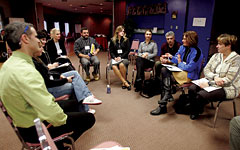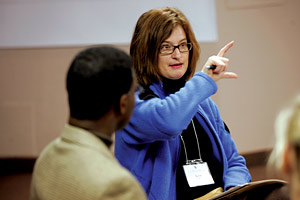
Inquiring Minds
There's scientific method in those lab coats
by Wendy Harris
Teaching Success
Teachers hope to lead Canada's Olympic class of 2006
by Teddy Katz
Nurturing the Naturals: Teacher-Parents at the Olympics
by Teddy Katz
A New Vision for the Profession
Changes proposed to teachers' ethical and professional standards
by Gabrielle Barkany
Transition to Teaching 2005
Underemployment in a mixed Ontario job market
by Frank McIntyre
A New Vision for the ProfessionChanges proposed to teachers' ethical and professional standardsby Gabrielle Barkany |
 |
"It's a privilege to be in students' lives," says Patrick Cahill, who holds a Special Education resource position at the Mississauga Catholic School Board. "That's why it's so critical to examine what we as teachers have in common: our principles, our values."
Cahill is one of 10,000 Ontario educators who are helping to refine the ethical standards and the standards of practice for their profession as part of the College's consultations about the evolving nature of teaching.
As the teaching profession evolves – changes in curriculum and context, diversity of student needs in classrooms, information technology – so should the standards.
"Teaching has become much more complex," says Déirdre Smith, Manager of the Standards of Practice and Education Unit. "Our consultations revealed that the expertise, skills and ethical awareness needed today to respond to students' varied needs continues to grow. And this must be reflected in the revised standards."
"Teachers and members of the public have told us that values are at the centre of effective teaching," says College Registrar Doug Wilson. "They are the heart, soul and mind of what teachers do every day, whether inspiring a student with a new concept in math, teaching a grammar rule or just facing a challenging situation in the classroom."
The two-year-long review has led to a proposal for significant changes, especially in the ethical standards.
"I am very proud of the proposed revisions," says Jennifer Pitt, Chair of the College Council's Standards of Practice and Education Committee, which is guiding the review. "I think all educators will see themselves reflected – whether they are superintendents, principals, classroom teachers or hold other positions, as members of the College."
Core values
Care, respect, trust and integrity have been identified as the qualities that should guide the practice of every teacher. These core principles describe the values that inform the decisions and actions of members of this profession. They are at the heart of teaching and are implicit in our standards of practice.
"What members and the public told us is that we need to formulate explicit ethical principles to underlie the standards of practice. The knowledge and skills that are distinctive to educators are first and foremost infused with ethical principles," says Smith.
As a result, each standard of practice should clearly identify its ethical dimension. The revised texts describe the ethical responsibilities and commitments in teachers' relationships with students, colleagues, parents and other educational partners. For example, regarding respect, it is noted that teachers value acceptance and collaboration by respecting the spiritual and cultural values of others.
 |
Members of the College and the public gathered for consultations throughout the province to discuss the Standards of Practice and Ethical Standards. |
Wilson offers another example: "While I am in front of a classroom explaining a new assignment in geography, I may demonstrate the practice component of the standards – certain examples or concepts I would use to transmit the knowledge – but I am first and foremost practising ethical qualities – demonstrating compassion and facilitating students' learning."
"The proposed ethical standards paint a picture of the teacher as a person who is trustworthy, diligent, responsible and has the humanity, consistency and honour to be with other people's children," says Elizabeth Campbell, a participant in the consultations and an associate professor at OISE/UT.
Proposed standards of practice
The five proposed standards of practice – Commitment to Students and Student Learning, Professional Knowledge, Professional Practice, Leadership in Learning Communities and Ongoing Professional Learning – have been condensed and refined to ensure that they clearly and explicitly reflect the reality and role of all members of the College – whether classroom teachers, school principals, superintendents or directors.
The proposed standards also profile the understanding of various forms of knowledge and the appropriate use of assessment and evaluation methods and of technology as well as leadership in creating and sustaining collaborative learning communities.
Each standard identifies principles of teaching and how to enhance student learning. For example, the standard on Commitment to Student Learning states that teachers are dedicated to engaging and supporting the students in their care, and they do so by treating students equitably and with respect.
“The proposed ethical standards paint a picture of the teacher who is trustworthy, diligent, responsible...”
Both the Standards of Practice and the Ethical Standards target sets of skills and attitudes that members of our profession should have.
"These proposed standards paint a more comprehensive image of the profession," says Pitt.
"The proposed standards are world class," says Wilson. "I am very proud of what we have accomplished. I have read standards from other jurisdictions and some go on for pages and pages. Ours do a good job of defining a profession in a concise yet comprehensive way."
Standards in teacher education
Together, the standards of practice and ethical standards provide the foundation for teacher education programs and ongoing professional learning as well as for members' daily practice. Every institution accredited to provide teacher education must demonstrate that its program reflects the profession's ethical standards and standards of practice.
"Revising the standards is a great way to stay current and not become complacent," says Cahill – one of a number of members who accepted an invitation published in Professionally Speaking to be trained as moderators so as to facilitate focus groups across the province conducted in English, in French and with First Nations educators. "If we don't continue to think and talk about them, then they can become almost meaningless. All of this helps to keep the standards alive."
Validation process
The College is now undertaking a validation process for the pro--posed revisions.
"We really hope that these proposed standards speak to the membership," says Pitt. "But it remains to be seen if we missed anything."
 |
The December 2004 Open Space consultation in Ottawa was one of several opportunities for members to reflect on the standards of practice and ethical standards. |
The process includes consultations with College members, education stakeholders, members of the public and community groups as well as education researchers and regulatory bodies for the teaching profession and other professions. Members' input is being solicited through consultation sessions plus information and feedback requests on the College's web site and in this issue of the magazine.
College Council will review for approval the final version of the revised standards following the current provincial validation period.
The proposed revised Standards of Practice and the Ethical Standards, as well as the feedback questionnaire, are on the College web site at www.oct.ca. Your input is vital. Please respond today.





